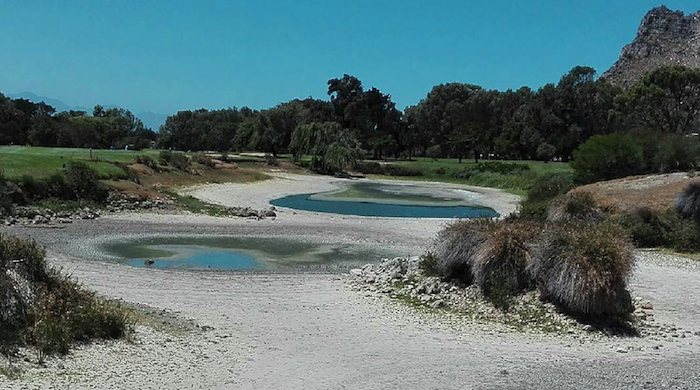It doesn’t benefit anyone to close down golf clubs simply because water has become a scarce commodity.
I was at the Sun Met at Kenilworth in late January and it struck me that the soft, green kikuyu carpet some very expensive horses were racing on was in stark contrast to the sandy, grassless surrounds inhabited by the even more expensive fashionistas. Clearly, some serious water resources have been thrown at the track, which means that insults won’t be far behind.
Day zero is gathering momentum, like a golf ball rolling through the green and heading for a dam. Except there aren’t any dams left in Cape Town. Given the scale of the disaster it is specious to even allude to the suffering of golf courses in the Cape, but I’m going to do it anyway.
Devonvale has already come under fire for using waste water from the clay tile quarry next door. Steenberg built a 9km pipe line from the Cape Flats Waste Water works, while Atlantic Beach has been using treated effluent from the houses of its residents for several years. Hence that guaranteed guffaw from the sign advising golfers not to lick their balls. A good trick, if you can do it.
The reality is that this is the new normal. If golf courses are to survive as going concerns they will need to think outside the box. Paradoxically, one of the solutions adopted up country was to include more water features, not less.
Back in 1994, during the run-up to the first free and fair elections, a rumour went around that the ANC in power would close down golf clubs, regarding them as ugly manifestations of white privilege. Wiser counsel prevailed when it was pointed out that it would lead to mass unemployment among the support staff; maintenance workers, caddies and caterers.
The next wave of rumours was about water and rates. The new government would hike the price of both to the point of unaffordability. So a plan was hatched for golf courses on the Highveld to become far more efficient in the way they stored and used water. The upshot was that clubs such as Rand Park and Houghton were quickly transformed from traditional parkland layouts to ones rich with dams and streams.
And looking back it was all for the best. Golfers got upgraded infrastructure and the new government turned out to be far less unfriendly than the golf clubs had been led to believe.
Returning to the present, it has to be acknowledged that an enormous slice of the Western Cape’s income derives from tourism. It doesn’t benefit anyone to close down golf clubs simply because water has become a scarce commodity. Unemployment is far worse now than it was in 1994 and golf clubs remain a labour-intensive resource.
One thing we will all have to accept is that conditioning will suffer. The recycled water that is available will be used to keep the greens alive. Perhaps we shall return to the sand greens once seen throughout South Africa. Preferred lies will become ubiquitous all year round. Golfers will be asked to understand the constraints placed upon the ground staff.
And at the end of the day, golfers tend to be understanding folk. The ones married to the game will do what all married people do; they will argue, apportion blame and then get on with it.
– Andy Capostagno represents the struggling golfer every month in Compleat Golfer







